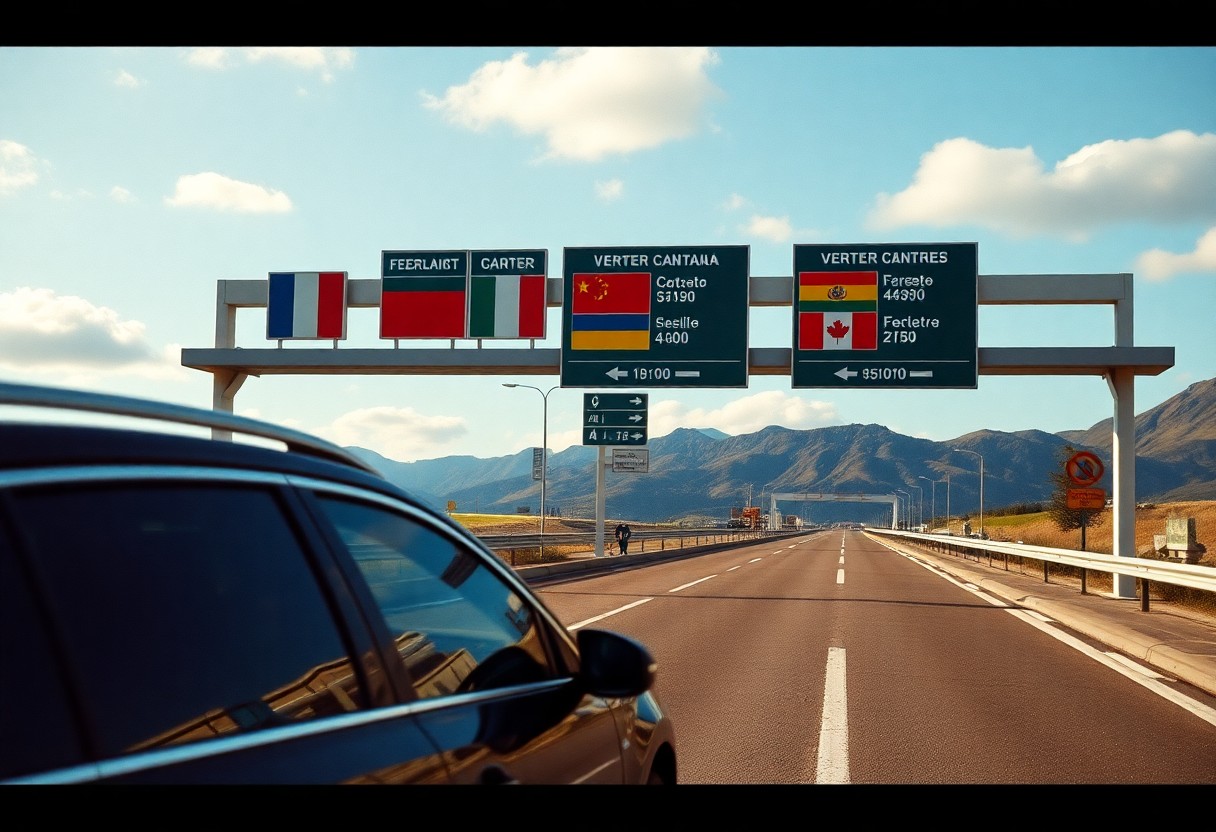When planning your overseas travel adventure in Europe with a rental car, thorough preparation is essential to ensure a smooth and enjoyable experience. This involves not only carefully planning your driving route but also understanding the various cross-border regulations that can significantly impact your journey. Rental companies often have different policies regarding travel between European nations. Typically, most rental agencies permit driving within Western European countries, but several restrictions may apply to Eastern European nations. It’s crucial to scrutinize your rental agreement, which outlines the specific borders you can cross and any associated fees. Before confirming your booking, verify that your rental agency permits travel to all your planned destinations, as violating cross-border rules could void your insurance and lead to hefty fines. Therefore, acquiring in-depth knowledge about these policies is vital for a successful road trip across Europe.
Master the Legal Requirements for Cross-Border Driving in Europe
Before embarking on your European road trip with a rental vehicle, it is crucial to fulfill legal necessities and rental company regulations. Ensure that your rental agreement explicitly states permission for cross-border travel and importantly, confirm that you possess adequate insurance coverage for each country on your travel route. Many rental companies impose restrictions based on specific European zones, particularly for high-end vehicles. Therefore, it is essential to familiarize yourself with these requirements to avoid any obstacles that may detract from your travel experience. Understanding the legalities can shield you from potential fines or complications while you explore the stunning landscapes of Europe.
Obtain Your International Driving Permit (IDP) Ahead of Time
One of the most vital documents you will need for driving in Europe is the International Driving Permit (IDP). This permit is not just a recommendation; it is a requirement and should be obtained in your home country before you begin your travel plans. The IDP acts as a crucial supplement to your standard driver’s license and is legally mandatory in many European countries. By securing your IDP well in advance, you ensure compliance with local driving laws, enhancing your driving experience across various nations. This allows you to focus on immersing yourself in the breathtaking scenery and rich cultural experiences that Europe has to offer.
Clarify Mileage Policies and Be Aware of General Restrictions
Renting a car in Europe often comes with the appealing offer of unlimited mileage, which is a significant benefit for travelers keen to explore extensively. However, it’s important to be informed that border crossing fees may apply, which can vary widely, typically ranging from €5 to €47.60 per crossing. These fees depend on your rental company and the specific countries involved in your travel itinerary. Furthermore, due to insurance regulations and security protocols, rental agencies frequently enforce specific restrictions based on the category of the vehicle. For instance, premium brands like BMW, Mercedes, and Audi tend to have more limited travel zones compared to standard models. Therefore, it’s crucial to communicate your travel intentions early to prevent any unforeseen expenses or complications.

Understand the Cross-Border Policies of Major Rental Companies
When renting a car in Europe, grasping the specific cross-border policies of each rental company is essential for a trouble-free journey. Major rental suppliers generally allow travel between Western European nations; however, strict restrictions often apply when it comes to Eastern Europe. The policies can vary significantly depending on the type of vehicle you select, as luxury cars often face more limitations compared to standard options. By educating yourself about these policies beforehand, you can make informed decisions regarding your rental choices and effectively plan your travel itinerary.
Investigate Cross-Border Regulations from Avis and Enterprise
Avis and Enterprise are notable rental companies that provide comprehensive coverage across Western Europe. Their vehicles are typically allowed to travel in most EU countries, including sought-after destinations like France, Germany, and Spain. However, it’s crucial to be aware that both companies impose particular restrictions on luxury vehicles, especially when traveling to Italy. For example, Enterprise charges a daily cross-border fee of 5 euros, with a maximum total of 50 euros. Being informed about these fees will assist you in budgeting effectively for your exciting travels across Europe’s diverse landscapes.
Review Cross-Border Driving Policies from AutoEurope and Hertz
Among the leading rental providers, AutoEurope and Hertz enforce specific country restrictions that are crucial for travelers to comprehend. For example, taking their vehicles into Eastern European nations such as Albania, Belarus, or Ukraine is strictly prohibited. Additionally, Hertz restricts luxury vehicles and SUVs from entering Italy, while AutoEurope’s rules may differ based on their local partners. Hence, it is essential to communicate your travel plans to your chosen rental provider prior to booking your vehicle. Your rental agreement will clarify applicable cross-border fees, which can vary by company and destination. For instance, Hertz charges 47.60 euros for crossing from Germany to another authorized country, and you may need additional insurance coverage for international travel.
Stay Informed About Geographical Restrictions When Driving
The rules surrounding cross-border travel with rental cars in Europe can differ significantly based on the rental company and the type of vehicle you select. Your rental agreement will clearly outline which countries you are permitted to visit with your rental vehicle. It is essential to keep your rental company informed about your planned travel route, as crossing borders without appropriate authorization can void your insurance and lead to substantial penalties, potentially resulting in a frustrating experience during your travels.
Identify the Countries You Are Allowed to Drive In
Most rental companies permit travel within Western European nations, including France, Germany, and Spain. Zone 1 countries primarily consist of EU member states in Western Europe, providing the most flexibility for your rental car usage. Your rental agreement will detail all the permissible countries relevant to your vehicle class, ensuring you have a clear understanding of where you can drive and allowing you to fully enjoy your European journey.
Acknowledge Restricted Territories for Rental Cars
Countries behind the Iron Curtain often enforce strict travel restrictions. Most rental companies do not allow travel to Eastern European nations, including Albania, Belarus, Ukraine, and Russia, due to increased risks and potential insurance complications. Additionally, further limitations may apply particularly to luxury vehicles and certain brands. High-end vehicles like BMW, Mercedes, and other premium models frequently face stricter geographical limits. If your travel plans involve multiple countries, it is advisable to choose a standard vehicle class to maximize flexibility and minimize possible fees or insurance issues.
Be Aware of Vehicle-Specific Limitations When Renting
While rental companies may have varying policies, most maintain strict regulations regarding which vehicles are permitted to cross borders. Therefore, it is essential to check the specific limitations associated with your chosen vehicle class before making a reservation. These restrictions are in place to protect valuable assets and ensure compliance with insurance requirements across different European territories, thereby safeguarding both the rental agency and the traveler.
Experience Greater Flexibility with Standard Rental Cars
Contrary to common beliefs, standard rental cars actually provide the most flexibility for cross-border travel. Typically, you can drive standard vehicles across most Western European countries without needing special permits. However, it is necessary to inform your rental company about your travel intentions beforehand and be prepared to settle cross-border fees that range from 5 to 50 euros depending on your circumstances and travel itinerary.
Recognize Restrictions on Luxury Vehicles for Cross-Border Travel
Substantial restrictions apply to luxury vehicles regarding cross-border travel. High-end cars face notable limitations when crossing borders, with renowned brands such as BMW, Mercedes, and Audi often prohibited from entering Eastern European countries or Italy. Generally, these premium vehicles are restricted to Zone 1 countries within Western Europe, which can significantly limit your travel options.
Moreover, if you choose to rent luxury vehicles, anticipate higher security deposits and more rigorous insurance requirements. Rental agencies such as Sixt and Enterprise impose limitations on premium brands like Jaguar, Maserati, and Porsche, allowing them only in selected Western European countries. For any border crossings, you will require special permission and possibly additional insurance coverage to ensure compliance with rental policies.
Budget Wisely for Cross-Border Costs
When preparing for any cross-border trips in Europe with a rental car, it is crucial to maintain a well-defined budget. Most rental companies charge additional fees for crossing borders, even within the Schengen Area, which can affect your travel finances. It is important to inform your rental company about your intended route and secure written permission before crossing any borders to avoid unexpected financial burdens.
Anticipate Typical Fees for Border Crossings
Border crossing fees in Europe typically range from €5 to €50, depending on the rental company and specific circumstances. For example, crossing from Germany to another approved country may incur a fee of €47.60 with Hertz, while Enterprise charges €5 per day, capped at 50 euros for trips starting in Germany. Being aware of these fees ahead of time will aid you in better financial planning while navigating your travels across Europe.
Consider Potential Additional Charges You May Encounter
At certain borders, you may encounter extra insurance requirements and documentation fees. Your rental company might impose charges for special permits, particularly when traveling to Eastern European countries or when utilizing luxury vehicles. Additionally, it’s wise to factor in the likelihood of higher insurance premiums for specific destinations, especially in Italy or Eastern Europe. Keep in mind that some credit card insurance policies may not cover all European countries, necessitating the purchase of additional coverage from your rental company to ensure peace of mind during your travels.

Understand the Nuances of Ferry Travel with Your Rental Car
Not all rental companies uphold the same policies regarding ferry travel in Europe. While most companies allow ferry travel, checking the specific rules related to your rental is essential to avoid complications. Crossing water borders often requires additional documentation and may incur extra fees that you should be prepared for. Additionally, your insurance coverage might change when traveling by ferry, making it vital to understand these aspects well before your journey begins.
Assess Company-Specific Policies Regarding Ferry Travel
Among the major rental companies, ferry travel policies can vary significantly. Avis and Hertz generally permit ferry travel to authorized countries, but it’s crucial to check destination restrictions in advance to prevent any potential issues. Conversely, Enterprise and Sixt may require pre-authorization and additional insurance for ferry crossings, which should be clearly outlined in your rental agreement to avoid any misunderstandings during your trip.
Important Considerations for Breakdown Coverage During Ferry Travel
Another critical aspect to contemplate is vehicle breakdown coverage while traveling by ferry. Most rental companies hold you liable for vehicle repatriation costs if your car experiences a breakdown after a ferry journey, which can amount to several thousand euros, depending on your location and the type of vehicle rented. This responsibility includes not only mechanical failures; if you encounter an accident or the vehicle becomes unusable for any reason while on an island, you are responsible for the expenses required to return the vehicle to the original rental location. Some rental agencies offer supplementary insurance to cover these costs, but it is crucial to secure this coverage before your journey to ensure you are well-protected.
Essential Tips for Successful Cross-Border Driving with Rental Cars
When gearing up to drive a rental car across European borders, conducting thorough research and understanding the specific regulations set by your rental company is vital for a seamless experience. While you may relish the freedom to cross borders in numerous European countries, each rental agency has unique policies and associated fees that you should be cognizant of. The type of rental vehicle you select can significantly influence your travel flexibility, particularly as luxury cars often face stricter limitations compared to standard options. Always verify the countries you can visit, account for any necessary border crossing fees, and check the regulations regarding ferry travel prior to embarking on your adventure. Diligently reviewing your rental agreement and obtaining an International Driving Permit will further prepare you for a hassle-free journey. Your proactive planning is essential to avoid complications at border crossings, allowing you to enjoy a more fulfilling travel experience.
Frequently Asked Questions About Driving Rental Cars in Europe
Can I drive my rental car to any European country?
No, rental companies impose specific restrictions regarding the countries you can visit. Most agencies allow travel within Western European nations such as France, Germany, and Spain. Nonetheless, many impose limitations on travel to Eastern European countries including Albania, Belarus, and Ukraine. Luxury vehicles often come with even more stringent restrictions. Always review your rental agreement for the allowed countries before any border crossings to ensure compliance.
Will I incur additional fees for crossing borders with a rental car in Europe?
Yes, many rental companies do impose border crossing fees. For instance, Hertz charges 47.60 euros for each border crossing from Germany, while Enterprise charges 5 euros per day (with a maximum cap of 50 euros) for trips originating in Germany. These fees apply even when traveling within the Schengen Area. It is essential to inform the rental company about your travel itinerary and settle these fees before crossing any borders to avoid unexpected charges.
Can I take my rental car on a ferry between European countries?
Yes, most rental companies permit ferry travel if your destination country is on their approved list. However, if your vehicle breaks down while on an island, you will be responsible for the costs associated with returning the vehicle to its original rental location. Some companies, such as Hertz, offer coverage for ferry travel through their insurance options (CDW, TP, or SuperCover). Always verify the specific ferry policies outlined in your rental agreement to avoid any surprises during your travels.
The Article: Is It Allowed to Drive a Rental Car Across European Borders? appeared first on https://rentacar24.org/
The Article Driving a Rental Car Across European Borders: Is It Allowed? Was Found On https://limitsofstrategy.com
The Article Driving a Rental Car Across Borders in Europe: Guidelines First Appeared ON
: https://ad4sc.com

Comments are closed